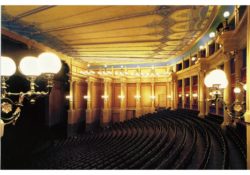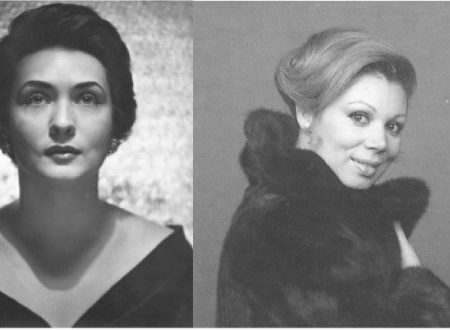Part of the Singers on Singing: Signature Roles series
The acclaimed bass-baritone José van Dam’s career spanned 50 years, from 1960 to 2010, during which he sang an enormous range of repertoire with a 250 year compass: extending from Bach to Messiaen, it comprised French, Italian, German and Russian opera, French melodies, German lieder and oratorio. He was profoundly admired not only for his masterly vocal command but also for his supreme grasp of greatly differing styles and his striking diversity of colours across the unusually broad gamut of music he performed. Equally at home in dramatic, lyrical and comic stage roles, his vocal and psychological breadth brought for cognoscenti and students of music alike what they have felt has been the ideally perfect interpretation of the title role in Massenet’s opera Don Quichotte. Specially for Signature Roles in our Singers on Singing series, Maître Van Dam spoke with Jon Tolansky about the opera, which he sings in the Warner Classics recording from which we are able to include extracts for this feature, thanks to Warner Classics’ generous and exclusive agreement.
November 2018
For me Don Quichotte is a portrait of an artist, because he is generous in his spirit, as artists should be, he is naive, as many artists are, and he is in love – not only in love with Dulcinée but altogether in love with life. In this way he is for me an artist, because he is not really aware of the actual world in which he is living. We see this very clearly in Cervantes’ novel – if we have the time to read it, as it is very long. So, Quichotte for me is an artist with all the goodness, the generosity, and the naivety that should characterize a good artist.
LISTEN TO THE AUDIO CLIP BELOW
Example 1 from “José van Dam discusses Massenet’s Don Quichotte”
Excerpt from Jules Massenet’s Don Quichotte
Don Quichotte: José van Dam
Orchestre du Capitole de Toulouse
Conductor: Michel Plasson
Read the libretto (English) for this example here
Might there possibly be an autobiographical element that Massenet was suggesting from his own life perhaps – not necessarily consciously, but maybe an inner feeling of self-identification with Quichotte?
I haven’t read a lot about Massenet’s life, but I think that like Quichotte he was a very good man and also a very romantic man, and it is possible that there is a kind of autobiographical connection in the opera.
When you mentioned how Quichotte is not in touch with the real world, you bring to mind what is perhaps the opera’s most powerful trait, which is its portrait, through Massenet’s music, of the innocence and vulnerability of Quichotte – a deeply poignant quality: almost sad.
Yes – most certainly. He is nostalgic. With Sancho Panza at his side, the situation is just a bit similar to Don Giovanni and Leporello in one way: like Leporello, Sancho does see things as they are. He is always afraid for his master, as he is for himself naturally, and so is Leporello. Also, both Don Quichotte and Don Giovanni, they both rush headlong in their lives to reach their goal with their women – but of course their view and feelings for women are completely different! Don Quichotte is romantic and idealistic, totally the opposite of Don Giovanni – and for me this is again why he truly is an artist. Of course, the opera is not exactly the same as the novel, and every performer of Don Quichotte sees him his own way. It is not easy to please everyone, but I think that if you sing and interpret the role with truth, each person should find the Don Quichotte that he is seeking.
LISTEN TO THE AUDIO CLIP BELOW
Example 2 from “José van Dam discusses Massenet’s Don Quichotte”
Excerpt from Jules Massenet’s Don Quichotte
Don Quichotte: José van Dam
Sancho: Alain Fondary
Orchestre du Capitole de Toulouse
Conductor: Michel Plasson
Read the libretto (English) for this example here
And maybe in interpreting this role there is a very fine balance needed between unreal fantasy and in fact real and great courage – because for all his dreaming, when Quichotte confronts the bandits, he is absolutely and genuinely prepared to die for his beloved Dulcinée.
Oh yes indeed. And this is because Don Quichotte is very religious, and he truly believes in God – which is why he sings this prayer “Seigneur, reçois mon âme” (“Lord, receive my soul”). Because he is a believer, he is not scared of death. And he will die for Dulcinée because he has tried to retrieve the necklace for her and therefore, with God behind him, his naivety and I can almost say his virginity make him unafraid of physically dying.
LISTEN TO THE AUDIO CLIP BELOW
Example 3 from “José van Dam discusses Massenet’s Don Quichotte”
Excerpt from Jules Massenet’s Don Quichotte
Don Quichotte: José van Dam
The Bandit Chief: Jean-Claude Barbier
Orchestre du Capitole de Toulouse
Conductor: Michel Plasson
Read the libretto (English) for this example here
But then, later it is his mental death that really shatters him. After he presents the retrieved necklace to Dulcinée and asks her if she will be his wife and marry him….. And she bursts out laughing. This is here the real death of Don Quichotte. Dulcinée is only gently making fun of him, but this is his death because she was his goal in his life, and then suddenly she is no longer there for him because of what she is saying. Here he sees her as she truly is, and it is his death – the beginning of the end, even though when she then sees how shattered he is, she tries to comfort him.
LISTEN TO THE AUDIO CLIP BELOW
Example 4 from “José van Dam discusses Massenet’s Don Quichotte”
Excerpt from Jules Massenet’s Don Quichotte
Don Quichotte: José van Dam
Dulcinee: Teresa Berganza
Orchestre du Capitole de Toulouse
Conductor: Michel Plasson
Read the libretto (English) for this example here
And this is why it is just after this scene that Massenet made the magnificent scene with Quichotte and Sancho Panza as Quichotte finally dies.
LISTEN TO THE AUDIO CLIP BELOW
Example 5 from “José van Dam discusses Massenet’s Don Quichotte”
Excerpt from Jules Massenet’s Don Quichotte
Don Quichotte: José van Dam
Sancho: Alain Fondary
Orchestre du Capitole de Toulouse
Conductor: Michel Plasson
Read the libretto (English) for this example here
And part of the immense pathos here is the pain we feel for Sancho Panza’s suffering – because in the course of the opera Sancho’s relationship with Quichotte has changed him: from the raw and clumsy simpleton of the first part of the opera, through protecting Don Quichotte while he has shared his ideals he has transformed into a man of understanding, courage, and even nobility. The grief of his loss is intense.
Sancho is maybe the next Don Quichotte in spirit. He is physically very different and he does not dream like Quichotte, but he is ready to continue the work of his master. We can imagine him taking the armoury.
For a bass-baritone, the role of Don Quichotte is a bit like Carmen for the mezzo-soprano or Boris Godunov for the bass or Falstaff for the baritone – by which I mean it is, like them, the ideal part for the complete range of that voice. It needs legato, lightness, colour and dynamism all in one. As with Falstaff, the voice must sound noble yet naive at the same time. Just as with Falstaff, one must not forget that Quichotte is a nobleman. And like Falstaff, he does not try to be comic – it is the others who laugh at him because of the situations he puts himself in. He is never intentionally amusing – he sees himself as a big person, and really it is his naivety that is the highlight of his personality. This most of all one must capture in the colours of the voice.
Don Quichotte (1992)
Don Quichotte: José van Dam
Sancho: Alain Fondary
The Bandit Chief: Jean-Claude Barbier
Dulcinee: Teresa Berganza
Orchestre du Capitole de Toulouse
Conductor: Michel Plasson
Warner Classics: 5099930910027
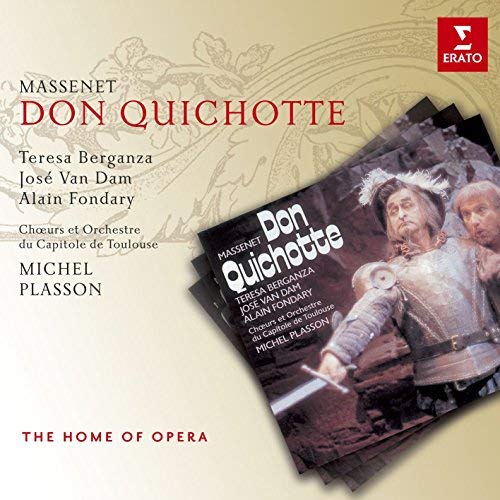
Related resources
text
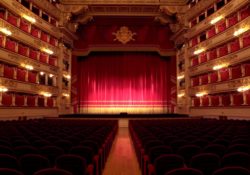
Singers on Singing: The Performer’s Perspective
audio
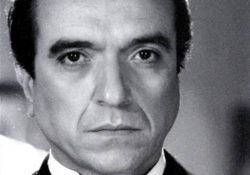
Singers on Singing :
Ruggero Raimondi
audio
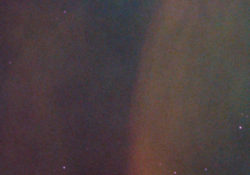
Song: Mirror of the World
Program 13
The ’89s
audio
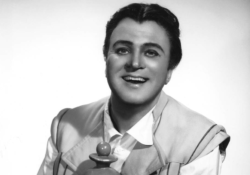
Singers on Singing :
Nicolai Gedda
audio
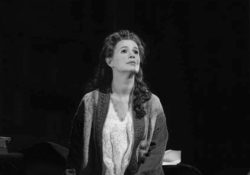
Singers on Singing :
Sophie Koch
audio

Singers on Singing :
Montserrat Caballé
audio
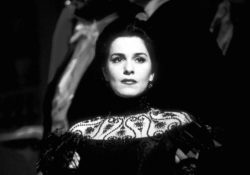
Singers on Singing :
Angela Gheorghiu
audio
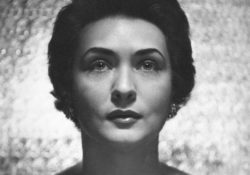
Singers on Singing :
Virginia Zeani
audio
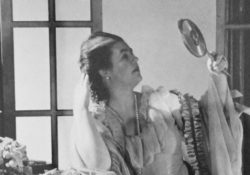
Singers on Singing :
Lotte Lehmann
audio
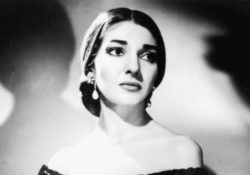
Singers on Singing :
Maria Callas
TEXT FOR AUDIO EXAMPLE 2
The scene with the Windmills
The mists rise slowly; little by little the mills appear.
DON QUICHOTTE
pointing to the horizon
Look!
SANCHO
looking around him
What? what?
DON QUICHOTTE
Disbeliever! look!
SANCHO
What? But what?
DON QUICHOTTE
pointing at the first mill
Sancho! On guard! On guard!
SANCHO
frightened
On guard !!
DON QUICHOTTE
See? over there? Standing up in deep silhouette – this terrible giant!
SANCHO
bewildered
Master, it’s a mill! A mill!
DON QUICHOTTE
Boor! It is the Giants who in their arrogance try to stop me.
Madness is their insolence,
I will chastise them!
SANCHO
with pity
O fatal insanity!
The poor thing starts again!
DON QUICHOTTE
challenging the first mill
Giant, Giant, Monstrous Horseman,
Giant, Giant, Monstrous Horseman,
If your heart is not battled with valour,
Make way, or with dagger and spear,
I bear you a challenge – I, the High Knight!
The mills begin to turn
Your actions only exalt my courage.
Back! back! or, just now,
I will cut wide in to your flesh and your blood,
SANCHO
tearful
My God!
DON QUICHOTTE
to Sancho
Squire, come with me,
in a thundering voice, he threatens Sancho terribly
I say that I challenge them!
SANCHO
What madness!
DON QUICHOTTE
Giant, Giant, Monstrous Horseman,
Giant, Giant, Monstrous Horseman,
If your heart is not battled with valour,
Make way, or with dagger and spear,
I bear you a challenge – I, the High Knight!
SANCHO
screaming in fear
Giant, Giant, Monstrous Horseman,
Giant, Giant, Monstrous Horseman,
If your heart is not battled with valour,
Make way, or with dagger and spear,
he bears you a challenge – he, the High Knight!
DON QUICHOTTE
He charges towards the windmills with repeated cries of
“Dulcinea, Dulcinea, for you, my Lady of Beauty!”
SANCHO
on his knees, crying out in panic
“What a misfortune, help, help my good master,
Alas, alas, Jesus, Mary, deliver him!”
TEXT FOR AUDIO EXAMPLE 3
Prayer
DON QUICHOTTE
with clasped hands; looking far away
Lord, receive my soul, it is not wicked,
And my heart is the heart of a faithful Christian.
May your eye be sweet to me and your face indulgent!
Being the knight of law, I am yours.
The bandit chief is visibly moved. Don Quixote is calm. The bandits look at each other, confused.
THE BANDIT CHIEF
in a grave voice
Really I think I dream, seeing your pale face,
Your great moving features from which the divine exhales
And your flashing eyes of sublime brightness!
TEXT FOR AUDIO EXAMPLE 4
O réponse fatale!
DULCINEE
laughing
ah! ah! ah! ah! marry me!
to shouts
ah! ah! ah! ah! ah! ah!
DON QUICHOTTE
bowing his head
O fatal answer!
Dulcinea, with a slow gesture, waves the crowd away / Sancho stands back.
Few words are sufficient to despair me.
DULCINEE
to the knight, simply, with her heart
Yes, I suffer your sadness …
Yes, I suffer your sadness …
TEXT FOR AUDIO EXAMPLE 5
Death of Quichotte
DON QUICHOTTE
Sancho, I promised you once … hills …
Castles … even an island … in abundance…
SANCHO
very sweet and modest
It was a simple island that I wanted to have!
DON QUICHOTTE
Take this island that it is always in my power to give to you! An azure wave laps its shores. Is it not beautiful and gay? It is the Isle of Dreams!
Sancho cries.
Do not cry Sancho, my good, my big Sancho!
SANCHO
Let me take off some of your clothes; you are stifling in your dress of an apostle, like in a dungeon.
DON QUICHOTTE
stopping the gesture of Sancho and very serious, very piously sweet
I die …
Say a prayer – say the Lord’s Prayer?
